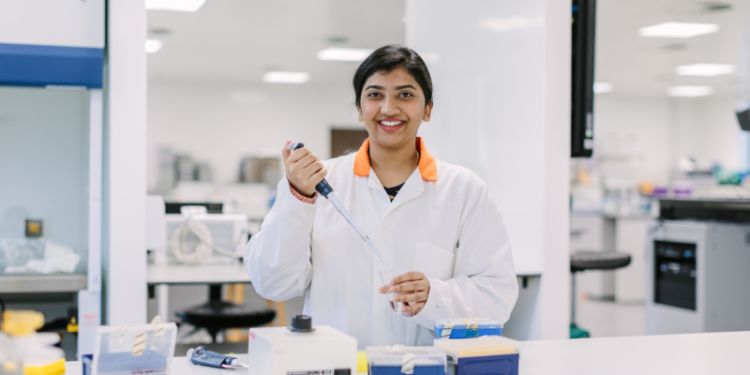Advanced Training Programme in Biological Sciences
Molecular Cloning

Monday 6 – Friday 10 July 2020
Overview
During this course you will undertake a series of practical exercises that are designed to introduce you to some of the key techniques of molecular biology such as cloning, Polymerase Chain Reaction (PCR), gel electrophoresis, and sequence analysis. The practical exercises will be inter-linked involving Green Fluorescent Protein (GFP), which is encoded by the gfp gene. GFP and its variants such as Enhanced Green Fluorescent Protein (EGFP) are widely used in biology as a reporter system to monitor a range of in vivo processes such as regulation of expression from a specific promoter.
Practical content
- Calculations, solution preparations, and pre-practical quiz intended to assist you in understanding the content covered.
- Purification of plasmid DNA and quantification by NanoDrop and agarose gel methods.
- Subcloning of gfp coding sequence from vector pET23 to expression vector pET28c using restriction enzyme, followed by ligation and transformation into a cloning host.
- Identification of successful ligation products by colony PCR.
- DNA sequence analysis using Benchling (sequencing of colony PCR amplicon [chromatogram, checking frame, amino acid sequence, mutagenesis data, alignment to wild-type sequence), and designing primers for site-directed mutagenesis.
Learning outcomes
On completing this course you should be able to:
- Demonstrate a high-level understanding and practical experience in traditional molecular cloning techniques.
- Compare and contrast traditional DNA assembly techniques with contemporary methods (e.g. Golden Gate, Gibson Assembly).
- Describe the impact of contemporary DNA assembly techniques on molecular (micro) biology research, and the field of synthetic biology.
- Demonstrate practical competency in the handling, manipulation, and analysis of DNA for genetic engineering purposes.
- Carry out basic troubleshooting on problematic DNA assembly experiments.
Course structure
The sessions will include a combination of lectures, practicals and data analysis sessions. You will be taught by a team of experienced academic staff and PhD demonstrators. There will also be opportunities to attend keynote lectures and network with staff and doctoral students. Teaching will be Monday to Friday with Wednesday afternoons free. There is no formal assessment.
Who would benefit from this course?
- Recent graduates who have sound theoretical background but preparing to undertake Masters-level training with a significant research component.
- Recent graduates with limited practical biosciences experience wishing to increase their competitiveness for research degree (PhD) programmes.
- Graduates from scientific disciplines outside the molecular/cellular biosciences looking to develop competencies in these areas.
- Undergraduate students approaching their final year of study, in particular those preparing for research projects.
Fees and funding
Programme fee: £750 per week payable to the University of Leeds prior to the course starting. This fee includes tuition costs, consumables for the practical sessions and lunch during the teaching day. It does not include costs for accommodation or any living expenses.
If you’re unsure about the application process, contact fbsadmissions@leeds.ac.uk or +44 (0) 113 343 3021.
How to apply
Applications for 2020 are now open!
All applications for the Advanced Training Programmes must be made online. The application deadline for the Advanced Training Programmes is 4pm on May 6 2020.
We recommend that you apply as soon as possible as enrolment is limited and allocated on a first-come first-served basis. Applying early also means you are more likely to secure a place on your first choice of course as popular subjects are likely to fill up quickly.
Read about visas, immigration and other information in International students.

